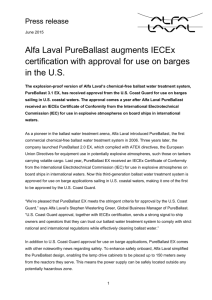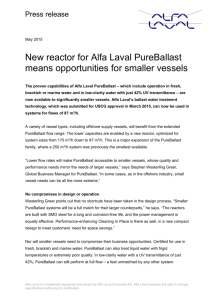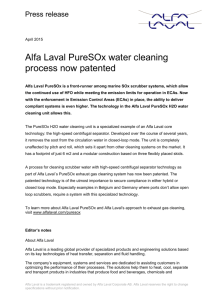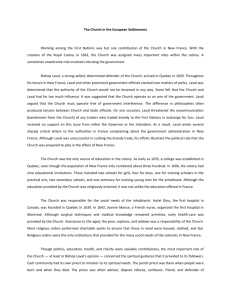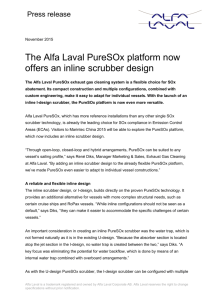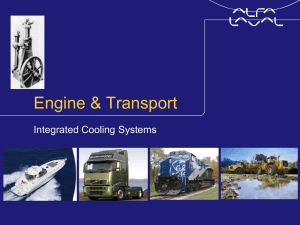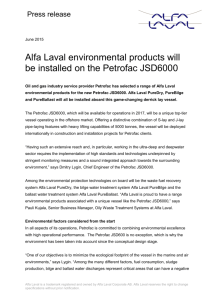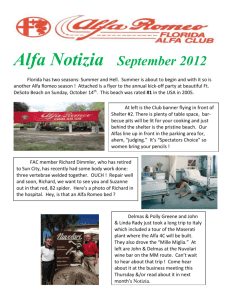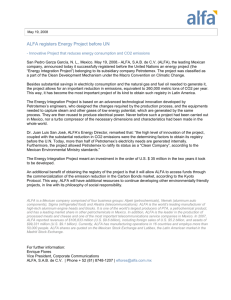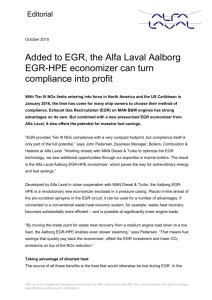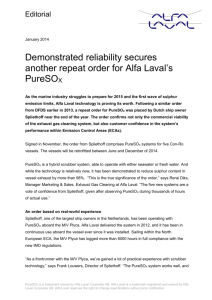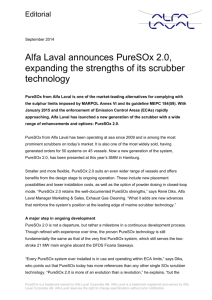For Alfa Laval PureDry, waste fuel recovery is only the beginning
advertisement
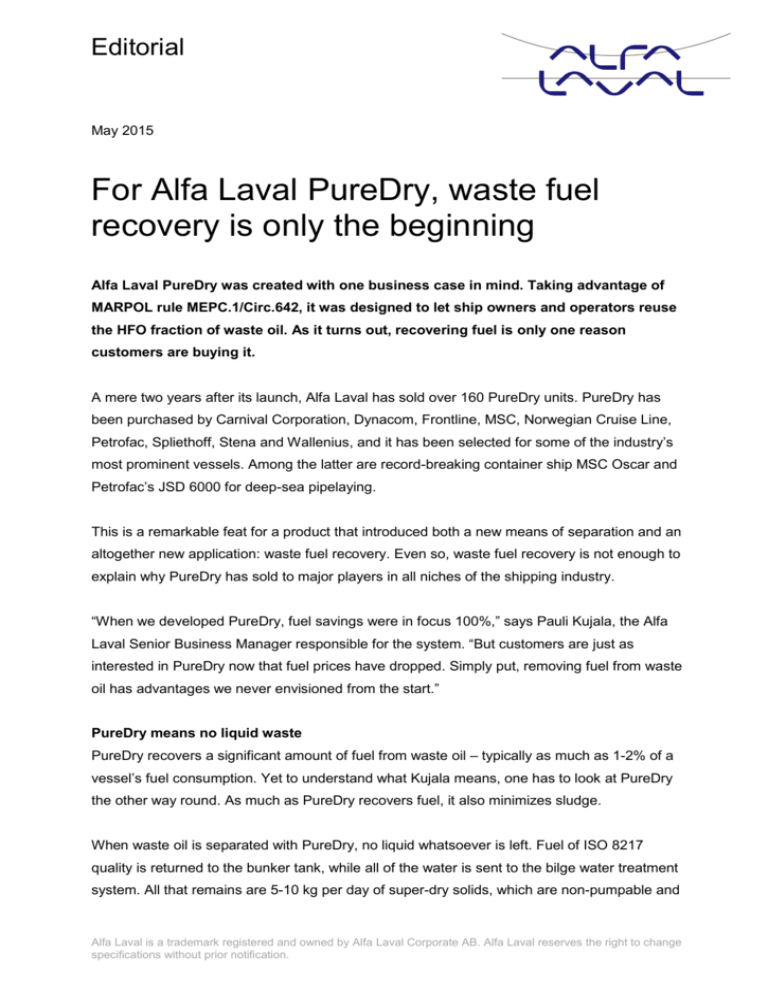
Editorial May 2015 For Alfa Laval PureDry, waste fuel recovery is only the beginning Alfa Laval PureDry was created with one business case in mind. Taking advantage of MARPOL rule MEPC.1/Circ.642, it was designed to let ship owners and operators reuse the HFO fraction of waste oil. As it turns out, recovering fuel is only one reason customers are buying it. A mere two years after its launch, Alfa Laval has sold over 160 PureDry units. PureDry has been purchased by Carnival Corporation, Dynacom, Frontline, MSC, Norwegian Cruise Line, Petrofac, Spliethoff, Stena and Wallenius, and it has been selected for some of the industry’s most prominent vessels. Among the latter are record-breaking container ship MSC Oscar and Petrofac’s JSD 6000 for deep-sea pipelaying. This is a remarkable feat for a product that introduced both a new means of separation and an altogether new application: waste fuel recovery. Even so, waste fuel recovery is not enough to explain why PureDry has sold to major players in all niches of the shipping industry. “When we developed PureDry, fuel savings were in focus 100%,” says Pauli Kujala, the Alfa Laval Senior Business Manager responsible for the system. “But customers are just as interested in PureDry now that fuel prices have dropped. Simply put, removing fuel from waste oil has advantages we never envisioned from the start.” PureDry means no liquid waste PureDry recovers a significant amount of fuel from waste oil – typically as much as 1-2% of a vessel’s fuel consumption. Yet to understand what Kujala means, one has to look at PureDry the other way round. As much as PureDry recovers fuel, it also minimizes sludge. When waste oil is separated with PureDry, no liquid whatsoever is left. Fuel of ISO 8217 quality is returned to the bunker tank, while all of the water is sent to the bilge water treatment system. All that remains are 5-10 kg per day of super-dry solids, which are non-pumpable and Alfa Laval is a trademark registered and owned by Alfa Laval Corporate AB. Alfa Laval reserves the right to change specifications without prior notification. page 2/4 have to be landed as dry waste or incinerated. “The super-dry solids are the suspended solids that comprise around 1% of the waste oil, and everything else is 100% eliminated,” Kujala says. “In an integrated system with Alfa Laval PureBilge, all of the oily waste streams are dried up. The oil is gone, the water is gone. There’s nothing to pump and virtually nothing to dispose of.” No pumping sludge onto barges Sludge minimization means simplicity in waste management, added to the total control PureDry enables over fuel consumption. Following separation with PureDry, the oil waste can be treated as any other landed waste. No question marks are attached to its content, and no additional offloading procedures are necessary. “Many vessels today get rid of their waste oil by pumping it onto receiving barges, which is yet another messy procedure for the crew to deal with,” Kujala says. “PureDry eliminates this procedure and all of its drawbacks, which has proven reason enough for some customers to buy it. The super-dry solids go straight out of PureDry and into a container, and the container itself goes straight onto land.” No adding fuel for sludge to burn For some other customers, the reduction of sludge into super-dry solids is a way to remove yet another procedure: sludge incineration. For these customers, not only does PureDry recover waste fuel, it prevents fuel from being wasted in the first place. “To get three tonnes of sludge to burn, you typically have to add one tonne of diesel,” explains Kujala. “Environmental considerations aside, the equation makes little sense if you can do things another way. Though sludge can still be incinerated outside of Emission Control Areas, customers would rather get fuel back with PureDry than use even more fuel to get rid of their waste.” A single product for many reasons Together, it would seem, these other aspects of working with PureDry have more than compensated for the past year’s lower fuel prices when it comes to PureDry sales. While waste fuel recovery may have been the intention, it is clearly just one side of the PureDry coin. Alfa Laval is a trademark registered and owned by Alfa Laval Corporate AB. Alfa Laval reserves the right to change specifications without prior notification. page 3/4 “Customers have a range of motives for investing in PureDry, only one of which is recovering waste fuel,” says Kujala. “PureDry was developed for one clear business case, but you can’t always predict how or why a product will be adopted by the market. For some marine customers, the strongest business cases are ones Alfa Laval didn’t see from the beginning.” To learn more about Alfa Laval PureDry and Alfa Laval’s approach to oil waste separation, visit www.alfalaval.com/puredry For further information, please contact: Pauli Kujala Senior Business Manager, Oily Waste Treatment Systems Marine & Diesel Equipment, Alfa Laval Phone: +46 708 76 57 96 E-mail: pauli.kujala@alfalaval.com Sofia Rugfelt Marine Trade Press Manager Marine & Diesel Division, Alfa Laval Phone: +46 706 69 53 57 E-mail: sofia.rugfelt@alfalaval.com www.alfalaval.com/marine Editor’s notes About Alfa Laval Alfa Laval is a leading global provider of specialized products and engineering solutions based on its key technologies of heat transfer, separation and fluid handling. The company’s equipment, systems and services are dedicated to assisting customers in optimizing the performance of their processes. The solutions help them to heat, cool, separate and transport products in industries that produce food and beverages, chemicals and petrochemicals, pharmaceuticals, starch, sugar and ethanol. Alfa Laval’s products are also used in power plants, aboard ships, in the mechanical engineering industry, in the mining industry and for wastewater treatment, as well as for comfort climate and refrigeration applications. Alfa Laval’s worldwide organization works closely with customers in nearly 100 countries to help them stay ahead in the global arena. Alfa Laval is a trademark registered and owned by Alfa Laval Corporate AB. Alfa Laval reserves the right to change specifications without prior notification. page 4/4 Alfa Laval is listed on Nasdaq OMX, and, in 2014, posted annual sales of a about SEK 35.1 billion (approx. 3.85 billion Euros). The company has today about 18,000 employees. www.alfalaval.com Alfa Laval is a trademark registered and owned by Alfa Laval Corporate AB. Alfa Laval reserves the right to change specifications without prior notification.
